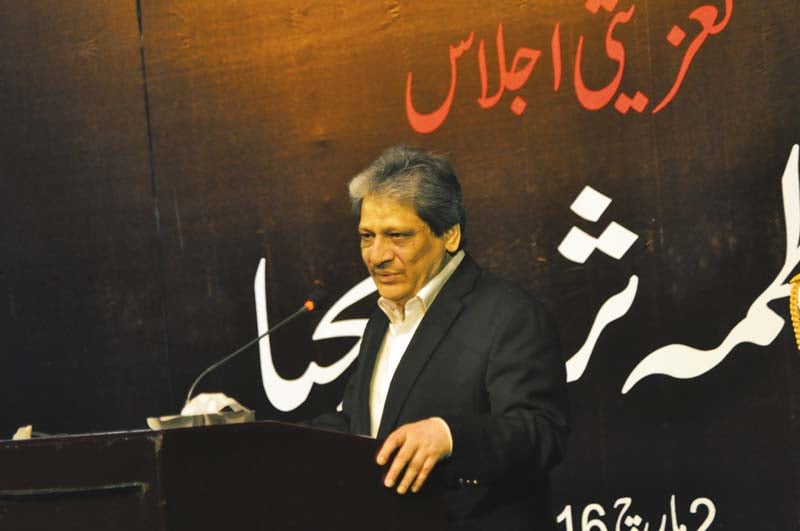
Many a time, it so happens that artists fail to achieve the same stature during their lifetime as is conferred upon them posthumously. It is almost like their passing suddenly reminds the world of their existence. The work these artists leave behind becomes worth so much more and they become hot topics of discussion, albeit temporarily.
The late Fatima Surraiya Bajiya, however, was not one of them. As one of Pakistan’s leading luminaries, she lived long enough to be venerated and written about extensively. And even now, about a month after her death, Bajiya – as she was commonly referred to – remains a vital cog in our literary circles. In this connection, the Arts Council of Karachi held a memorial event for Bajiya on Wednesday, inviting prominent personalities from politics, media and cultural spheres to honour the legendary writer.
An epoch ends with Bajia’s passing
Arts Council Administrative Committee Chairman Ahmed Shah commenced the evening – though 45 minutes late – by sharing his inspiration behind the idea. “I spoke to Anwar Maqsood about celebrating Bajiya’s life. For now, he said we should hold a condolence reference,” said Shah. “Bajiya was a playwright, larger than life character whose existence revolved around helping those in need.” He went on to recall other literary stalwarts who breathed their last recently, such as Intizar Hussain, highlighting how one generation paves the way for their young ones to comes forth and take over.
“In the past hundred years, we saw poets like Iqbal and Faiz and singers like Fareeda Khanum, Iqbal Bano and Noor Jehan. Of traditionalists, we have names like Haseena Moin and Bajiya. Now sadly, the next 100 years won’t have luminaries like these,” Shah added.
Considering how prolific Bajiya had become within the Pakistani cultural circuits, one would wonder how much else there could be to know about the novelist. And yet, nearly everyone who spoke at the reference divulged something new about her. As musician Arshad Mahmud claimed, “There were many various traits of her personality. She would ask for something to be done and I just couldn’t say no to her.”
Media personality Javed Jabbar recalled the times he spent with Bajiya in their days of youth, praising his old friend. “I have been associated with this family since 1963 whose torch-bearer was Bajiya. She played a significant role in calming the family sphere,” he shared. “Bajiya was just five feet tall but her personality went up to 10 feet!”
Similarly, yesteryear’s actor Huma Mir also reminisced the times her parents visited Bajiya’s house, seeking her advice on various matters. “There have been sad and happy days, but she was part of our home throughout,” claimed Mir.
As the evening progressed, it became apparent that Bajiya’s literary prowess aside, it was her presence as a mother figure in the lives of all those present that really drew them to the event. Producer Sultana Siddiqui, for instance, called her “the pedestal of motherly love” while actor Anwar Iqbal admitted how the news of Bajiya’s death made him realise what a mother really is, although he had lost his biological one at the age of just two.
Of course, an evening commemorating Bajiya would be incomplete without commenting on the intellectual that she was. Renowned economist and educationist Ishrat Husain said, “I cannot assert she was a great playwright but I can assure you that her house oozed with creativity. She may have been self-educated but look at the limitless creativity she possessed!”
Producer Qasim Jalali also spoke, recalling the numerous PTV productions he had worked on with Bajiya, who he believes knew how to write all too well on any given subject. “She was that big, shady tree under which other flowers and shrubs bloomed,” stated Jalali. Poet Sahir Ansari said, “She enjoyed visiting the old ‘Koocha Saqafat’ and loved reading books so often that one was amazed how her thoughts governed her mind. She was a traditionalist to the core, in her thoughts and ethics. Her vision remained strong.”
Former talk show host Mehtab Akbar Rashidi added, “Bajiya was ‘Jan-i-Mehfil.’ Through her, women grew strong as she encouraged all of them to rise and follow their dreams.”
Bajiya’s brother Anwar Maqsood, a literary legend himself, said, “I have been penning down my thoughts for the past 50 years now. From the first writing till the last one, I had always made it a point to show it to Bajiya before all else.”
According to Maqsood, Bajiya possessed a love for the classical, and respect was a key that she had locked in the paloo of her white sari. “Everything is now gone with her,” he added.
Even Senior Minister Nisar Khuhro came forth to pay his respects to Bajiya. “She was an icon. She worked tirelessly for female emancipation,” he said.
But the final word of the day came from Governor of Sindh, Ishratul Ibad, who said, “We had a strange relationship. She was a mother figure to me, and her phone was the first stop of interaction, shortly to be followed by her arrival. Bajiya would come all of a sudden, with a problem that needed to be resolved and soon enough, I obliged.” Ibad also spoke of the one time he visited her and was told she doesn’t recognise anyone, anymore. “But she did remember me and inquired about each person in my family. Numerous times have I been scolded by this bold lady, but I felt elated by her gesture. She is a part of our lives and will live in our hearts, forever.”
Published in The Express Tribune, March 4th, 2016.
Like Life & Style on Facebook, follow @ETLifeandStyle on Twitter for the latest in fashion, gossip and entertainment.





1732428506-0/Untitled-design-(5)1732428506-0-270x192.webp)











COMMENTS
Comments are moderated and generally will be posted if they are on-topic and not abusive.
For more information, please see our Comments FAQ